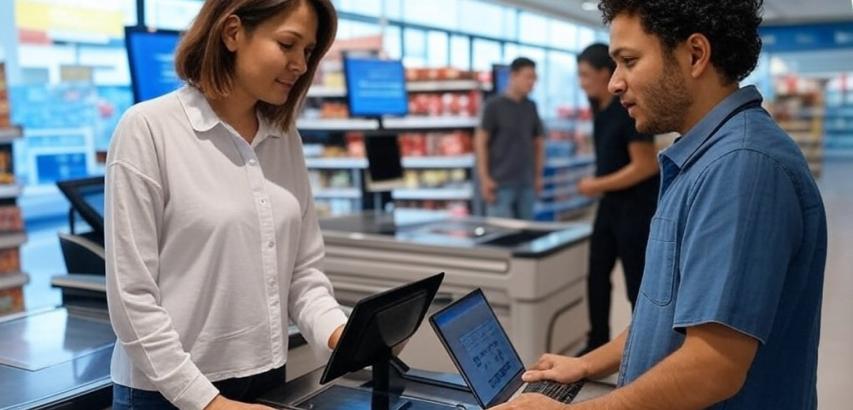Executive Summary
The Smart Supermarket is a next-generation retail concept that integrates AI, IoT, automation, and data analytics to redefine grocery shopping. By offering contactless checkout, personalized shopping experiences, and zero-waste operations, the Smart Supermarket aims to cater to tech-savvy urban consumers while promoting sustainability. With a projected revenue of $12M by Year 3, this venture targets the growing demand for convenience, efficiency, and eco-conscious retail solutions.
Vision: To become the leading innovator in smart retail, merging cutting-edge technology with sustainable practices.
Mission: To deliver seamless, personalized, and eco-friendly shopping experiences through intelligent automation and data-driven insights.
Market Analysis
Industry Overview
The global smart retail market is projected to reach $67B by 2028 (CAGR: 24.3%).
Key Trends:
Rising adoption of contactless payments and automated checkout systems.
Demand for hyper-personalized shopping experiences (e.g., AI recommendations).
Shift toward sustainability (e.g., plastic-free packaging, zero-waste initiatives).
Target Market
Segment | Description |
|---|---|
Urban Millennials/Gen Z | Tech-savvy shoppers (ages 20–40) valuing speed, convenience, and customization. |
Eco-Conscious Consumers | Shoppers prioritizing organic, local, and sustainable products. |
Busy Professionals | Time-strapped individuals seeking grab-and-go options and same-day delivery. |
Competitive Advantage
AI-Powered Personalization: Tailored product recommendations via app.
IoT Inventory Management: Real-time stock tracking and automated restocking.
Sustainability Leadership: Zero-waste packaging and partnerships with eco-brands.
Products & Services
Core Offerings
Smart Shopping Experience:
App Integration: Digital shopping lists, aisle navigation, and real-time promotions.
Contactless Checkout: Automated payment via facial recognition or app scan.
Subscription Services:
Express Delivery: 1-hour delivery for premium members.
Meal Kits: Pre-portioned ingredients with AI-generated recipes.
Sustainability Initiatives:
Bulk Stations: Refillable containers for grains, spices, and detergents.
Eco-Brand Partnerships: Curated selection of plastic-free products.
Technology Features
Smart Shelves: RFID tags and weight sensors for inventory tracking.
AI Chatbots: In-app assistants for product queries and substitutions.
Energy Efficiency: Solar-powered stores and IoT-optimized refrigeration.
Revenue Model
Revenue Stream | Description |
|---|---|
Product Sales | Revenue from groceries, household items, and eco-friendly products. |
Subscription Fees | Premium memberships (15/month) for express delivery and exclusive discounts. |
Data Monetization | Aggregated shopping insights sold to brands (opt-in, anonymized data). |
In-Store Ads | Digital screens promoting products and local businesses. |
Marketing Strategy
Brand Positioning
“Smart Supermarket: Smarter Shopping, Sustainable Living.”
Tactics
Digital Campaigns:
Social Media: TikTok/Instagram reels showcasing AI features and zero-waste stations.
SEO: Target keywords like “contactless grocery store” and “AI-powered shopping.”
Community Partnerships:
Collaborate with local farmers and eco-brands for pop-up events.
Sponsor sustainability workshops and zero-waste challenges.
Loyalty Programs:
Reward points for reusable container usage and eco-friendly purchases.
Referral bonuses (10 credit per successful referral).
Operational Plan
Store Design & Technology
Location: 10,000 sq. ft. urban store with high foot traffic.
Tech Infrastructure:
Smart shelves, facial recognition cameras, and self-checkout kiosks.
Mobile app with AR navigation and real-time inventory updates.
Supply Chain
Local Sourcing: 60% of produce from regional farmers and eco-suppliers.
AI Forecasting: Predictive analytics to minimize overstocking and waste.
Staffing
Tech Support Team: Maintain IoT devices and AI systems.
Sustainability Ambassadors: Educate customers on zero-waste practices.
Delivery Fleet: Electric vehicles for carbon-neutral logistics.
Financial Plan
Startup Costs
Category | Cost |
|---|---|
Technology & Equipment | 1.5M |
Store Renovation | 800,000 |
Inventory & Initial Stock | 500,000 |
Marketing & Launch | 400,000 |
Total | 3.2M |
Financial Projections
Year | Revenue | Net Profit |
|---|---|---|
1 | 5M | -500K |
2 | 9M | 1M |
3 | 12M | 3M |
Funding Requirements
Seek 4M in seed funding (equity/debt mix).
Allocate 50% to tech, 30% to operations, and 20% to marketing.
Risk Analysis
Key Risks
High Initial Costs: Mitigate via phased rollout and investor partnerships.
Tech Adoption Barriers: Offer in-store tutorials and app onboarding guides.
Regulatory Compliance: Hire legal experts for GDPR/CCPA and food safety laws.
Sustainability & Social Impact
Zero-Waste Goal: Achieve 90% waste diversion by 2025.
Carbon Neutrality: Offset emissions via renewable energy and reforestation partnerships.
Community Support: Donate unsold food to local shelters and food banks.
Conclusion
The Smart Supermarket combines innovation, convenience, and sustainability to meet the evolving needs of modern consumers. With a scalable tech infrastructure, strong differentiation, and a focus on eco-friendly practices, the project is positioned to capture 15% market share in urban retail hubs and achieve 12M revenue by Year 3.
Next Steps:
Secure funding and finalize pilot store location.
Partner with tech vendors for IoT and AI integration.
Launch a 6-month beta testing phase with select customers.
This business plan outlines a clear roadmap to establish the Smart Supermarket as a pioneer in the future of retail, driving profitability while fostering environmental and social responsibility.
 |  |  |
